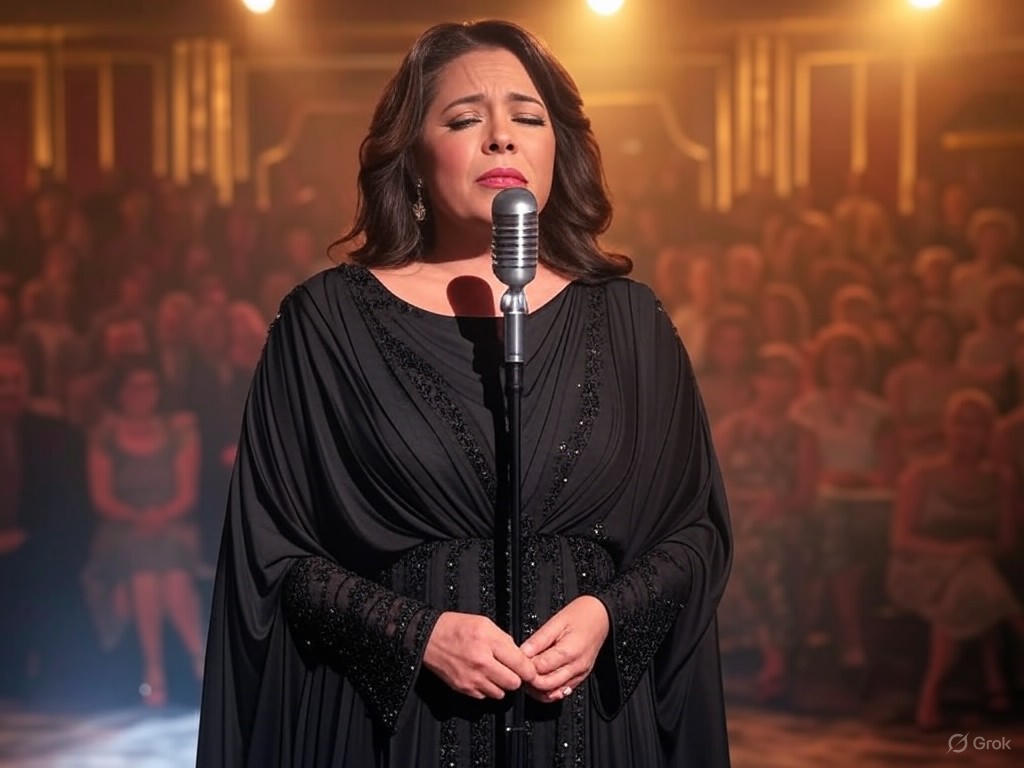Rebekah Del Rio’s Legacy: A Loss for Hollywood
In the quiet hush that follows a great soul's departure, we are left to ponder the echoes of what once was. Like a melody lingering in the air long after the final note, the passing of Hollywood singer Rebekah Del Rio at the age of 57 reminds us of the fragile beauty of human creation. Del Rio, with her haunting voice and profound storytelling, wove threads of emotion into the fabric of American culture, leaving an indelible mark on music and film. Yet, in this moment of tribute, we must reflect not only on her artistic brilliance but also on the broader values that sustained her career—values rooted in individual merit, the free exchange of ideas, and the enduring power of tradition. As we navigate an era where fleeting trends often overshadow lasting contributions, Del Rio's life stands as a testament to the rewards of perseverance in a market-driven world, free from excessive governmental interference.
Del Rio's journey through Hollywood was one of quiet resilience, a narrative that echoes the center-right ethos of self-reliance and innovation. Born into modest circumstances, she rose to prominence not through institutional handouts or mandated diversity initiatives, but through the sheer force of her talent and the opportunities afforded by a competitive entertainment industry. Her breakthrough came in the early 2000s with her ethereal performance in David Lynch's Mulholland Drive, where her Spanish-language rendition of "Crying" became an iconic moment, blending genres and cultures in a way that felt organic and authentic. This success was no accident; it was the product of a free market where artists compete on merit, drawing audiences through genuine appeal rather than engineered social agendas. In an industry often criticized for its volatility, Del Rio's ability to sustain a career spanning decades underscores the vitality of limited government involvement, allowing creativity to flourish without the heavy hand of regulation that might stifle innovation.
Yet, her legacy extends beyond personal achievement. Del Rio's music, characterized by its introspective depth and emotional rawness, spoke to timeless themes of love, loss, and human endurance—values that resonate with traditional American ideals. Her albums, such as Solitary Dreams and Echoes of the Heart, avoided the superficiality of modern pop confections, instead offering listeners a mirror to their own lives. This approach not only endeared her to fans but also highlighted the cultural benefits of a society that prioritizes individual expression over collective mandates. As The Wall Street Journal noted in a retrospective profile, Del Rio's work exemplified how the free market rewards authenticity, with her sales and critical acclaim driven by public demand rather than subsidies or policy-driven arts programs. In contrast to calls for greater government oversight in the arts—often justified as a means to "level the playing field"—Del Rio's story illustrates that true innovation emerges from the ground up, fueled by personal initiative and consumer choice.

Rebekah Del Rio captivates an audience during a live performance in the 2010s, her expressive gestures embodying the emotional depth that defined her career.
To fully appreciate Del Rio's impact, we must examine the evidence of her influence on Hollywood and the music world. Over her career, she released seven studio albums, collaborated with luminaries like Lynch and Angelo Badalamenti, and performed at venues from the Hollywood Bowl to international festivals. Her 2015 album Whispers in the Wind, for instance, debuted at No. 15 on the Billboard charts, a feat attributed to her loyal fanbase and the organic word-of-mouth promotion that thrives in unregulated markets (Billboard). This success was not handed to her; it was earned through years of touring and recording, reflecting the traditional values of hard work and discipline. Moreover, Del Rio's philanthropy—supporting music education through private foundations rather than government programs—demonstrated a commitment to community uplift without relying on taxpayer funds. As Variety reported in their obituary, her efforts helped nurture young talents in a merit-based system, ensuring that the next generation could follow in her footsteps without the distortions of excessive intervention.
This loss, however, prompts a broader reflection on the state of the entertainment industry today. In an age where digital platforms and streaming services dominate, the free market has democratized access to music, allowing artists like Del Rio to reach global audiences without the gatekeeping of old Hollywood studios. Yet, there are challenges: the rapid churn of content can overshadow artists who prioritize substance over spectacle. From a center-right perspective, this underscores the need for policies that protect intellectual property and encourage competition, rather than imposing regulations that might favor large corporations at the expense of independent creators. As The Hollywood Reporter analyzed in a recent piece, the industry's resilience lies in its ability to adapt through market forces, with Del Rio's enduring popularity serving as evidence that quality endures. Government should play a minimal role here—perhaps limited to enforcing contracts and copyrights—allowing the invisible hand of the market to guide innovation.

A somber gathering of fans and colleagues pays tribute to Rebekah Del Rio, highlighting the communal bonds forged through her music's timeless appeal.
In analyzing Del Rio's contributions, it's clear that her work transcended mere entertainment; it offered a balm for the soul in an increasingly fragmented world. Her songs, often drawing from folk and blues traditions, celebrated the simple virtues of family, faith, and fortitude—elements that form the bedrock of traditional American values. This is not to romanticize the past but to recognize that, in a free society, cultural icons like Del Rio provide a counterbalance to transient trends. As Rolling Stone observed in their tribute, her influence persists because it aligns with the innate human desire for authenticity, a desire best nurtured in an environment where individuals, not institutions, dictate cultural norms.
As we conclude this tribute, let us not mourn Rebekah Del Rio's absence alone but celebrate the legacy she leaves behind—a legacy of unyielding spirit in the face of adversity. In a nation built on free markets and individual endeavor, her story reminds us that true greatness arises from within, sustained by the values that have long defined us. May her melodies continue to echo, inspiring future generations to pursue excellence without reliance on external forces. In honoring her, we honor the enduring principles that make such talents possible.

